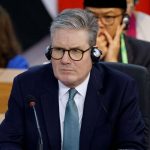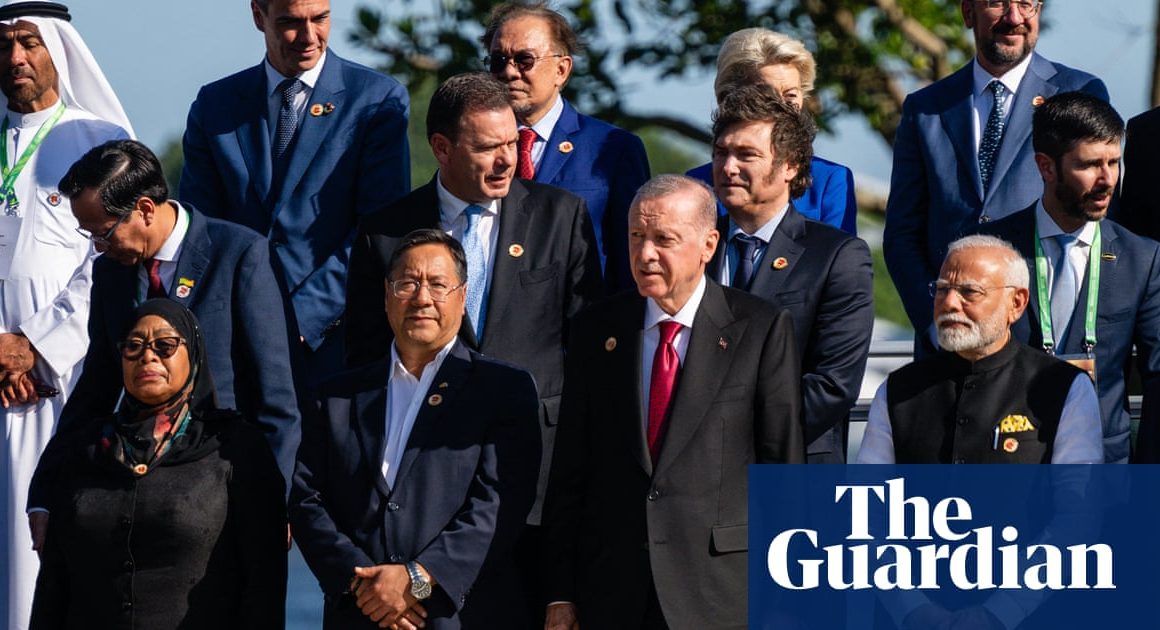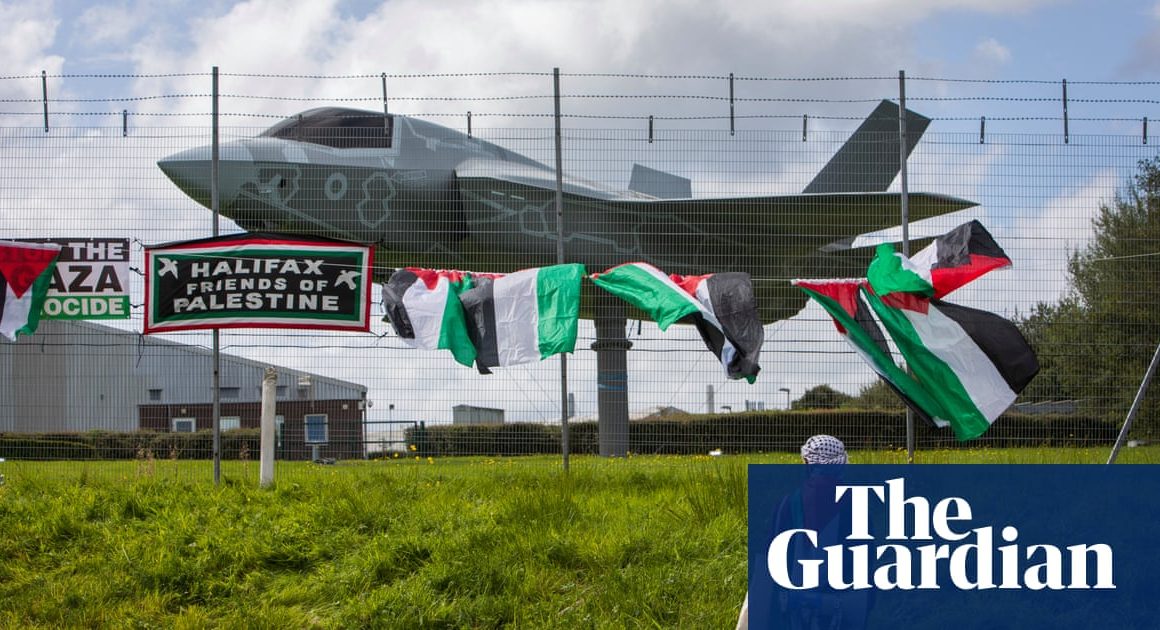Long-range missile decision ‘taken long ago’, claims Lavrov
Russian foreign minister Sergei Lavrov has been speaking about the expectations that Ukraine will shortly be given permission to fire Anglo-French Storm Shadow and US Atacms missiles, which have a range of 190 miles plus, into Russia.
“We haven’t a doubt that the decision to lift restrictions on long-range weapons to attack the Russian Federation’s territory was taken long ago,” Lavrov said on Thursday during what the Russian foreign ministry said was an ambassador’s round table.
He added: “Now they are trying to legalise it in the public space in some way.”
Lavrov went on to make an unsubstantiated claim that western states were providing intelligence to Ukraine to enable strikes inside Russia against targets including civilian infrastructure.
Key events
Russia says recaptured 10 villages in Kursk region
Russia said on Thursday that its army had recaptured 10 settlements in its Kursk border region, where Ukraine last month launched a major cross-border incursion.
“Units of the ‘North’ group of troops liberated 10 settlements within two days,” the defence ministry said in a statement posted on its Telegram channel, reports Agence France-Presse (AFP).
Antony Blinken was asked at his press conference in the last half an hour with Poland’s minister of foreign affairs whether a green light has tacitly been given to allow Ukraine to use US long-range weapons inside Russia, reports Olivia Gazis, a national security reporter at CBS news.
She says the US secretary of state repeated his assertion that “we will adjust, we will adapt” policies to ensure Ukraine has what it needs to defend itself against Russia.
Poland backs increased pressure on Russian government – Sikorski
Poland’s minister of foreign affairs, Radosław Sikorski, has said that his country is in favour of lifting restrictions on Ukraine using long range weapons and supports increasing pressure on the Russian government.
“We should continue to deliver [Ukraine] advanced air defence systems … and lift restrictions on the use of long-range weapons,” he told journalists at a joint news conference in Warsaw with the US secretary of state, Antony Blinken.
Long-range missile decision ‘taken long ago’, claims Lavrov
Russian foreign minister Sergei Lavrov has been speaking about the expectations that Ukraine will shortly be given permission to fire Anglo-French Storm Shadow and US Atacms missiles, which have a range of 190 miles plus, into Russia.
“We haven’t a doubt that the decision to lift restrictions on long-range weapons to attack the Russian Federation’s territory was taken long ago,” Lavrov said on Thursday during what the Russian foreign ministry said was an ambassador’s round table.
He added: “Now they are trying to legalise it in the public space in some way.”
Lavrov went on to make an unsubstantiated claim that western states were providing intelligence to Ukraine to enable strikes inside Russia against targets including civilian infrastructure.
Volodymyr Zelenskiy gave a detailed account yesterday to the US secretary of state, Antony Blinken, and the UK foreign secretary, David Lammy, of why Ukraine needs permission to strike targets deep inside Russia, reports the Kyiv Independent, citing a source close to the Ukrainian president.
The newspaper cited the same source as saying that Zelenskiy trip to the US to attend a UN assembly in New York is not yet certain as his travel schedule may change based on the “situation on the ground”.
The UK foreign minister, David Lammy, has posted this message on X after his joint visit to Kyiv with the US secretary of state, Antony Blinken.
“We stand with Ukraine today, tomorrow, and for as long as it takes,” said Lammy.
Both men have returned to Poland after their visit to Ukraine. The pair took the overnight train from Kyiv and crossed into eastern Poland at 6.30am local time.
Ukraine’s Pokrovsk without drinking water supply or natural gas for cooking and heating, say authorities
The key eastern Ukraine city of Pokrovsk is without a drinking water supply or natural gas for cooking and heating, authorities said on Thursday, as the Russian army’s attritional slog across the Donetsk region lays waste to public infrastructure and forces civilians to flee their homes.
A water filtration station in Pokrovsk was damaged in recent fighting, and more than 300 hastily drilled water wells are the city’s last source of drinking water, Donetsk regional governor Vadym Filashkin said, according to a report by the Associated Press (AP).
The previous day, Russians destroyed a natural gas distribution station near Pokrovsk, Filashkin said. About 18,000 people remain in the city, including 522 children, he said.
More than 20,000 people have left in the past six weeks as Russian forces creep closer to residential areas, Filashkin said. “Evacuation is the only … choice for civilians,” he added.
Pokrovsk is one of Ukraine’s main defensive strongholds and a key logistics hub in the Donetsk region, which lies on part of the 1,000 kilometer (600 mile) frontline. Its capture would compromise Ukraine’s defensive abilities and supply routes and would bring Russia closer to its stated goal of capturing the entire Donetsk region, which it partially occupies.
China’s Xi to attend Brics summit in Russia, says foreign minister
Chinese president Xi Jinping will attend the Brics summit in Russia next month, China’s foreign minister announced on Thursday, reports Reuters.
“President Xi is very happy to accept your invitation”, Wang Yi told Russian president Vladimir Putin at a meeting in St Petersburg.
US secretary of state Antony Blinken has shared a post on X from his attendance at the Crimea Platform summit.
In the post he wrote:
Crimea is Ukraine.
Crimea shows the future Putin seeks for all of Ukraine.
It is not an isolated case – it is a blueprint. At the Crimea Platform, I reiterated US support for Ukraine’s fight against Russia’s aggression.”
Crimea is Ukraine.
Crimea shows the future Putin seeks for all of Ukraine. It is not an isolated case — it is a blueprint.
At the Crimea Platform, I reiterated U.S. support for Ukraine’s fight against Russia’s aggression. pic.twitter.com/V5ZWWCYrDY
— Secretary Antony Blinken (@SecBlinken) September 12, 2024

Dan Sabbagh
Antony Blinken and David Lammy’s joint trip to Kyiv, to be followed by Keir Starmer’s trip to Washington DC to see Joe Biden on Friday, has inevitably lifted expectations that Ukraine will shortly be given permission to fire Anglo-French Storm Shadow and US Atacms missiles, which have a range of 190 miles plus, into Russia.
There are no shortage of risks. Allowing Ukraine to fire western-made weapons deep into Russia could have a dramatic political impact on the course of a war mired in a grim, attritional slog that appears to be favouring Moscow, whose forces are bearing down on the strategic town of Pokrovsk.
Blinken and Lammy provided a potential justification for the missile escalation on Tuesday, censuring Iran for supplying a first batch of short-range, high-speed Fath-360 ballistic missiles to Russia, a step up from the slower Shahed drones it has given Moscow until now. Russia was likely to use the missiles “within weeks”, Blinken warned.
The Fath-360 missiles have a range of about 75 miles, according to the US. They could be used to strike Ukrainian cities close to the frontline such as Kharkiv or Zaporizhzhia, Sloviansk and Kramatorsk in the Donbas, and even theoretically Kyiv, and allow Russian to use its own stock of longer-range cruise and ballistic missiles to attack targets elsewhere in Ukraine, as it has done throughout the war.
The missile war in Ukraine may appear unceasing, but it follows its own logic of inventories, with Russia’s goal being to exhaust Ukraine’s air defences. Kyiv has already run out of short-range Buk and S-300 systems, which left its power stations defenceless earlier this year. Ukrainian sources estimate that about two-thirds of its energy generation has been destroyed, and it will not be possible to repair more than a fraction before what is likely to be the country’s hardest winter since Russia’s 2022 full-scale invasion.
You can read more of Dan Sabbagh’s analysis piece here:
A Russian court on Thursday put three lawyers who used to represent the late opposition leader Alexei Navalny on trial over “extremism” charges, reports Agence France-Presse (AFP).
Navalny died in unclear circumstances in an Arctic prison colony in February, where he was serving a 19-year sentence for leading an “extremist” organisation.
Since his death, Russian authorities have escalated a campaign against the Kremlin critic’s backers, allies and family – arresting journalists who covered his court hearings and adding his wife, Yulia Navalnaya, to a “terrorists and extremists” blacklist.
The trial of three of his former lawyers – Vadim Kobzev, Alexei Liptser and Igor Sergunin – opened Thursday in a court in the Vladimir region east of Moscow, AFP journalists in the courtroom reported.
According to AFP, the three stood in a metal cage for defendants at the start of the hearing, before the judge granted the prosecution’s request to move the session behind closed doors, ejecting public spectators and journalists from the hall.
Arrested in October 2023, the trio are accused of participating in an “extremist” organisation, charges which carry a maximum of six years.
Investigators claim they passed messages between Navalny and his associates in the outside world, helping the Kremlin critic continue his outlawed political activity from behind bars. At the time, Navalny’s team alleged the arrest of the lawyers was an attempt to isolate Navalny even further in prison, where he spent most of the time in solitary confinement.
At a pre-trial hearing, Sergunin pleaded guilty, independent media reported, while Kobzev and Liptser rejected the charges.
The Kremlin has rejected accusations from Navalny’s allies that president Vladimir Putin ordered him killed in jail. The west and Moscow were in talks about freeing Navalny in a prisoner exchange when he died.
According to Reuters, the Kremlin said on Thursday that letting Ukraine use western weaponry to strike Russian territory would deepen western involvement in the conflict and trigger a reaction from Moscow. Reuters cited the state news agency, Tass, for the report.
The US secretary of state, Antony Blinken, is wrapping up a three-nation, Ukraine-focused European tour in Poland after hearing repeated appeals from Ukrainian officials to use western-supplied weaponry for long-range strikes inside Russia.
According to Reuters, Blinken traveled to Warsaw on Thursday after spending a day in Kyiv with the UK foreign secretary, David Lammy, during which they pledged to bring the Ukrainian requests to their leaders.
US president Joe Biden and UK prime minister Keir Starmer are to meet in the US on Friday amid signs both Washington and London are growing more receptive to allowing the Ukrainians to use their arms to hit targets farther inside Russia than previously okayed.
Nato member Poland, which shares a border with Ukraine, has been supportive of the Ukrainians and Blinken is likely to hear further requests for easing weapons-use restrictions from Polish president Andrzej Duda, prime minister Donald Tusk and foreign minister Radosław Sikorski, reports Reuters.
On Wednesday, Blinken and Lammy announced that the US and the UK had pledged nearly $1.5bn in additional aid to Ukraine during their visit to Kyiv. Blinken announced more than $700m in humanitarian aid, while Lammy confirmed that the UK would provide another $782m in assistance and loan guarantees.
Zelenskiy calls Chinese-Brazilian peace proposal ‘destructive’ – report
Ukrainian president Volodymyr Zelenskiy said a Chinese-Brazilian peace proposal is “destructive” and simply serves as a “political statement” in an interview posted on Wednesday, according to Reuters.
“The Chinese-Brazilian proposal is also destructive, it’s just a political statement,” Zelenskiy said, according to the Brazilian Metrópoles media outlet. “How can you offer ‘here is our initiative’ without asking anything from us?”
Chinese president Xi Jinping could meet his Ukrainian counterpart Volodymyr Zelenskiy next month, a Ukrainian delegate said in Beijing on Thursday, reports Reuters, as China opened its biggest annual military diplomacy event.
Oleksandr Chalyi, a former deputy foreign minister of Ukraine, told one of the opening sessions of the three-day Xiangshan Forum that diplomacy had improved in recent months between Beijing and Kyiv, and that a meeting was now possible.
Noting Chinese efforts to help restore European security, Chalyi said “now all of us in Ukraine are waiting for some contacts, direct contacts between president Zelenskiy and president Xi”.
Beijing has cast itself as neutral in Russia’s 30-month-old invasion of Ukraine, but maintains close strategic ties with Moscow and did not join a peace summit organised by Ukraine in June.
Here are some pictures from Konotop, which local officials said was hit in an overnight Russian drone attack. The images are press handouts from the National Police of Ukraine in Sumy region.
Russian drones damage energy infrastructure in Sumy region town, injuring 14 people, say Ukraine
Russian drones inflicted significant damage to the northern Ukrainian town of Konotop’s energy infrastructure in an overnight attack that injured at least 14 people and cut electricity to the settlement, local officials said on Thursday.
According to a report by the Reuters news agency, rescuers were working to restore power in the town, which had a prewar population of about 83,000. Regional officials said there had been 10 explosions during the attack and mayor Artem Semenikhin said the power system was in critical condition.
“At the moment, energy workers are doing everything they can to provide electricity to the hospital and the water supply system,” he said in the early hours of Thursday. Hospitals continued to operate, he added.
Konotop is in Sumy region, which has been particularly targeted by Russia in recent weeks.
The strike on Konotop was part of a broader Russian attack using 64 drones, the air force said. It shot down 44 of them over nine different regions, it said.
Reuters reports that Semenikhin said the authorities in Konotop did not know when the power would be restored and they planned to supply water on hourly basis.
The attack also damaged seven apartment buildings, medical and educational institutions, a shop, a bank and a section of the town’s tramway, regional prosecutors and local officials said.
The Russian drone attack also caused a fire at a furniture storage warehouse in the central Khmelnytskyi region which emergency services were still trying to extinguish in the morning, governor Serhiy Tiurin said.
The governor of the northern Chernihiv region said Russia had stepped up its attacks there in the past day, causing damage to the region’s infrastructure. He did not say what exactly had been hit, reports Reuters.
Blinken hints US will lift restrictions on Ukraine using long-range arms in Russia

Luke Harding
The US secretary of state, Antony Blinken, gave his strongest hint yet that the White House is about to lift its restrictions on Ukraine using long-range weapons supplied by the west on key military targets inside Russia, with a decision understood to have already been made in private.
Speaking in Kyiv alongside the UK foreign secretary, David Lammy, Blinken said the US had “from day one” been willing to adapt its policy as the situation on the battlefield in Ukraine changed. “We will continue to do this,” he emphasised.
Blinken said he and Lammy would report back to their “bosses” – Joe Biden and Keir Starmer – after their talks on Wednesday with the Ukrainian president, Volodymyr Zelenskiy.
The foreign secretary suggested Iran’s dispatch of ballistic missiles to Moscow – revealed this week – had changed strategic thinking in London and Washington. It was a “significant and dangerous escalation”, he said.
He added: “The escalator here is Putin. Putin has escalated with the shipment of missiles from Iran. We see a new axis of Russia, Iran and North Korea.” Lammy urged China “not to throw in its lot” with what he called “a group of renegades”.
British government sources indicated that a decision had already been made to allow Ukraine to use Storm Shadow cruise missiles on targets inside Russia, although it is not expected to be publicly announced on Friday when Starmer meets Biden in Washington DC.
The two leaders are planning to discuss the war in Ukraine, and how it could be ended, as part of a wide-ranging foreign policy discussion, though they will avoid an intense focus on any individual weapons system, as the aim of the conversation is strategic.
You can read the full piece by Luke Harding and Dan Sabbagh here:
Russian counter-offensive reported in Kursk
Russian forces have begun a significant counter-offensive against Ukrainian troops in Russia’s Kursk region, according to pro-Moscow war bloggers and a senior Russian commander.
Pro-Ukrainian observers also reported heavy fighting in part of the occupied area and the possible Russian recapture of villages.
Russian forces were said to have taken several villages on the west of the sliver of Russia that Ukraine has carved out, pushing Ukrainian forces to the east of the Malaya Loknya river south of Snagost. Russia’s defence ministry said it had defeated Ukrainian units at a number of villages.
There was no independent confirmation or immediate comment from Ukraine.
In other developments:
-
Ukraine’s air force said on Thursday it had shot down 44 out of 64 drones launched by Russia overnight. Russian forces also used five missiles, the air force added in a statement posted on the Telegram messaging app.
-
The Institute for the Study of War said on Thursday morning that it would be “premature to draw conclusions” about the counterattacks at this stage. The thinktank reported: “Russian forces began counterattacks along the western edge of the Ukrainian salient in Kursk oblast and reportedly seized several settlements north-east and south of Korenevo on September 10 and 11.”
-
The ISW continued: “The size, scale, and potential prospects of the September 11 Russian counterattacks in Kursk oblast are unclear and the situation remains fluid as of this report … Ukrainian forces reportedly began new attacks against the Russian counterattack west of Snagost and throughout the Ukrainian salient in Kursk oblast.” Maj Gen Apti Alaudinov, who commands Chechnya’s Akhmat special forces fighting in Kursk, said Russian troops had gone on the offensive and taken back control of about 10 settlements in Kursk.
-
The UK’s foreign secretary, David Lammy, and his US counterpart Antony Blinken have returned to Poland after their visit to Ukraine. The pair took the overnight train from Kyiv and crossed into eastern Poland at 6.30am local time.
-
US secretary of state, Antony Blinken, gave his strongest hint yet that the White House is about to lift its restrictions on Ukraine using long-range weapons supplied by the west on key military targets inside Russia. A decision is understood to have already been made in private. Blinken and the British foreign secretary, David Lammy, met with Volodymyr Zelenskiy, the Ukrainian president, in Kyiv on Wednesday.
-
British government sources indicated that a decision had already been made to allow Ukraine to use Storm Shadow cruise missiles on targets inside Russia, although it is not expected to be publicly announced on Friday when Keir Starmer, the British prime minister, meets Joe Biden in Washington DC.











